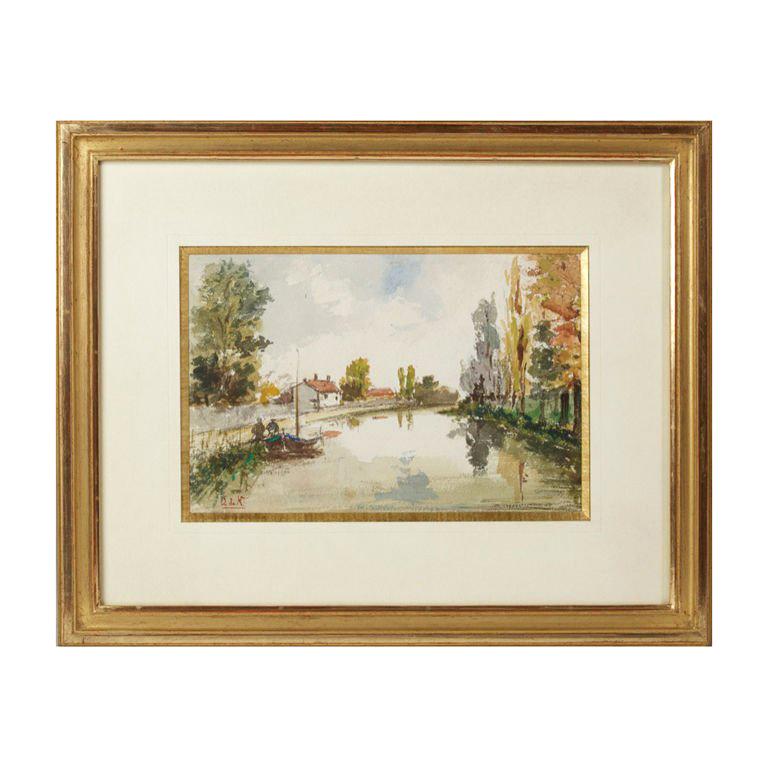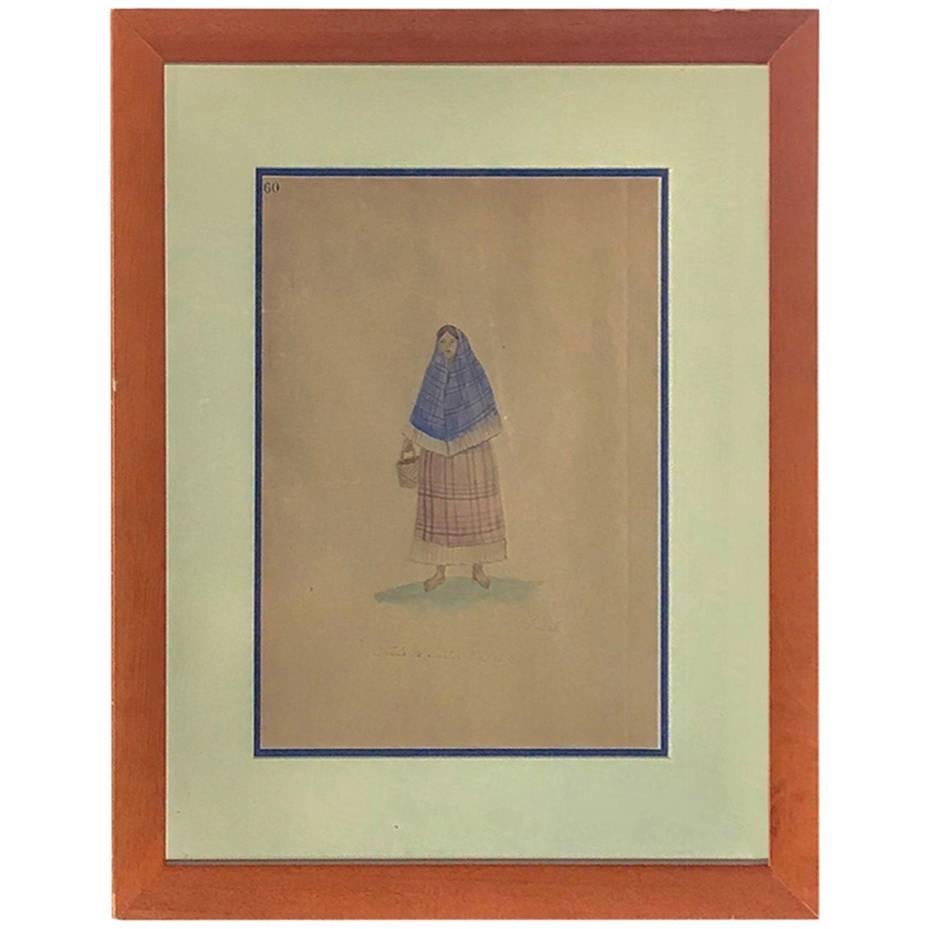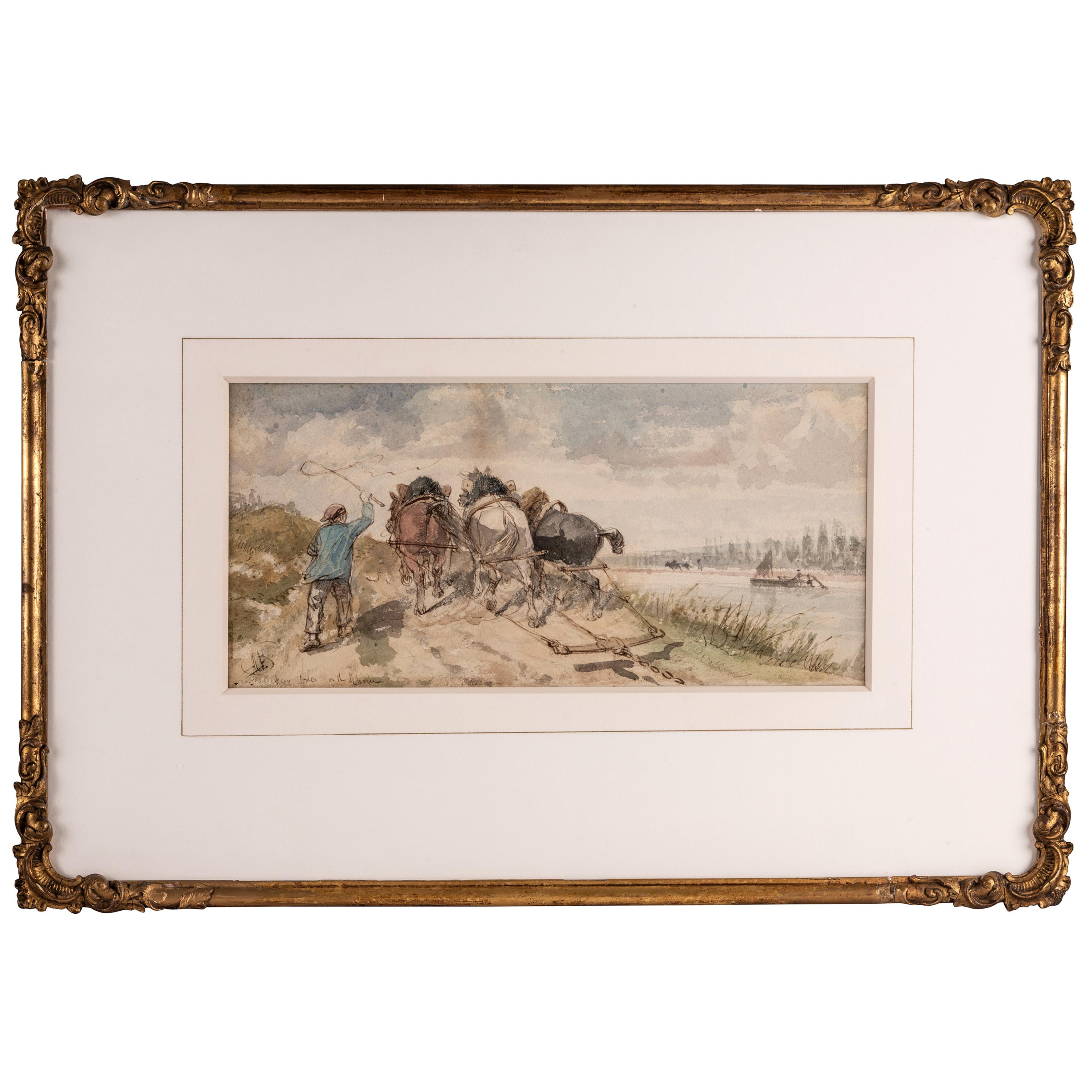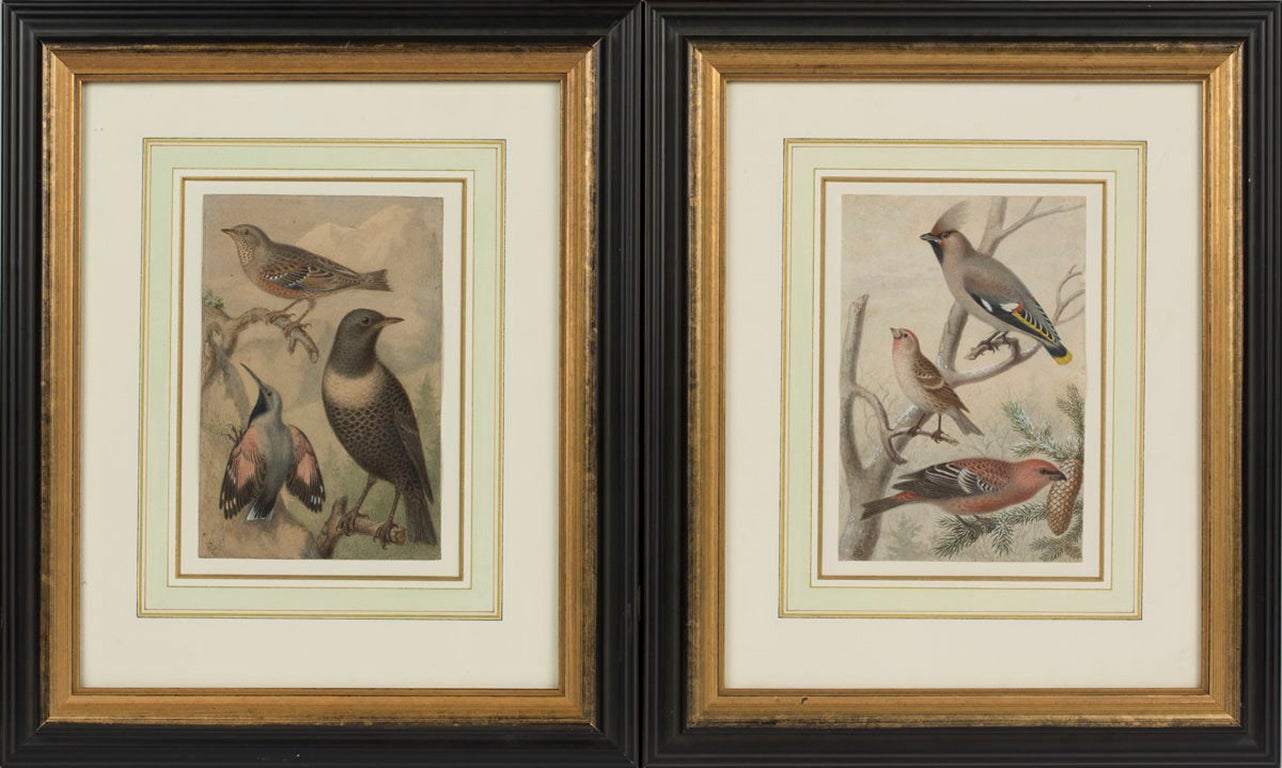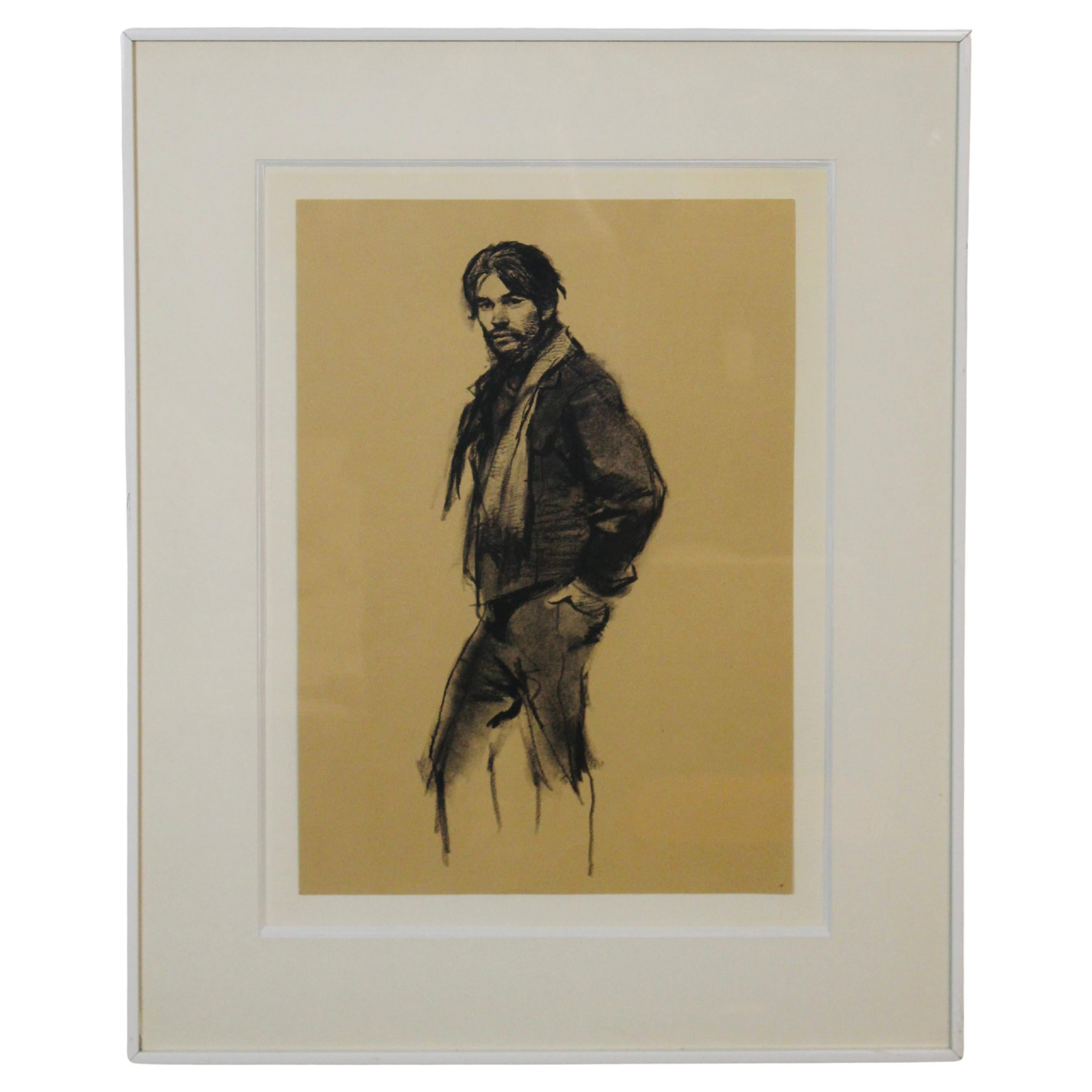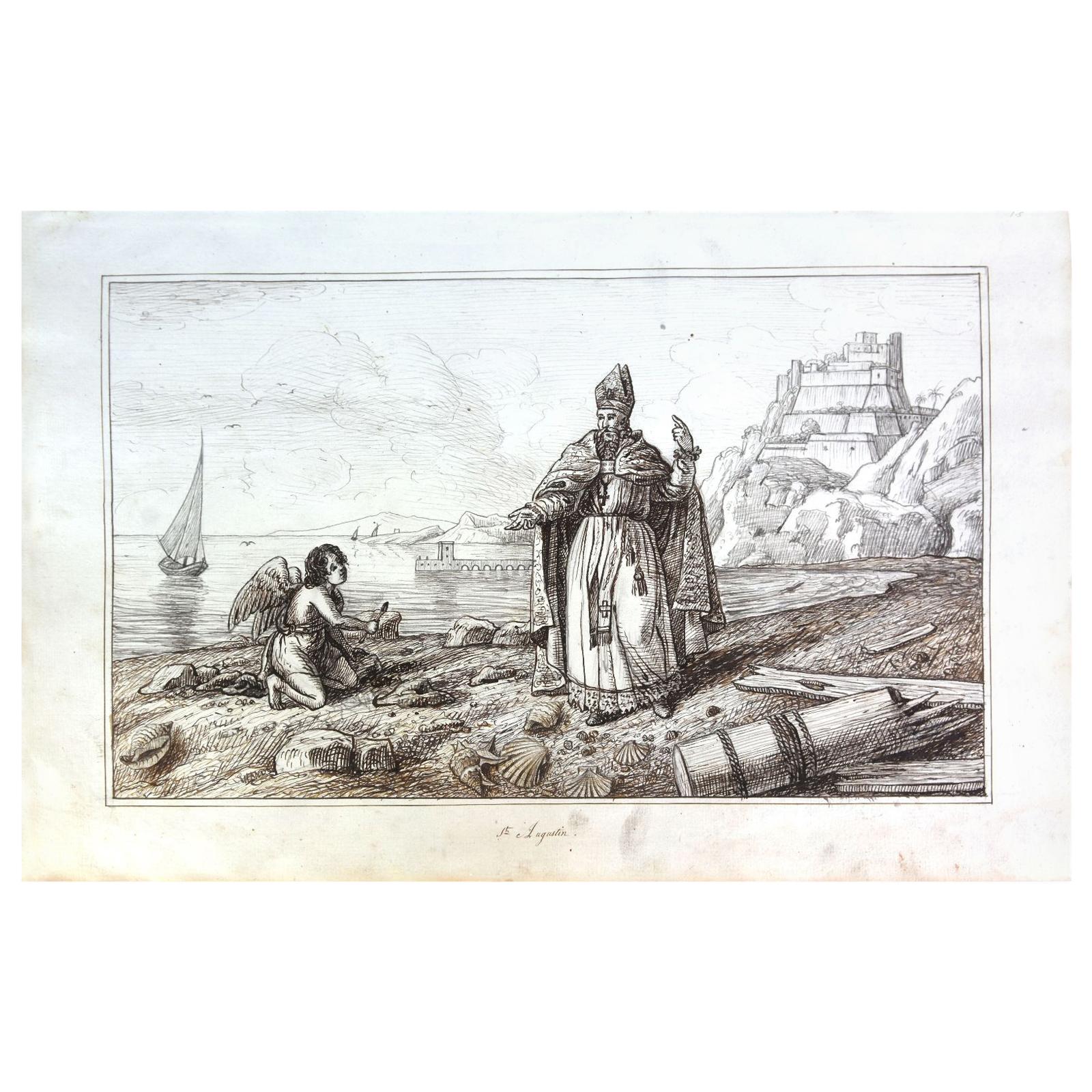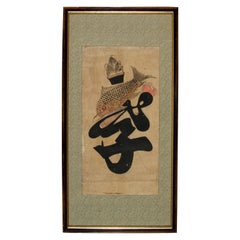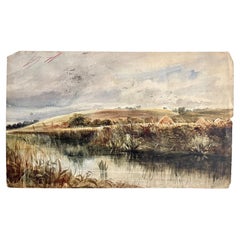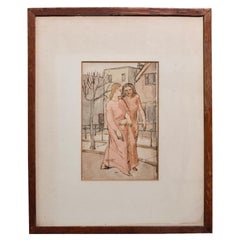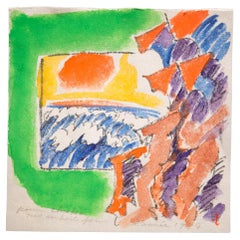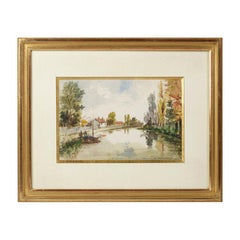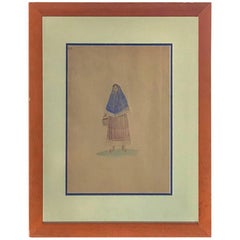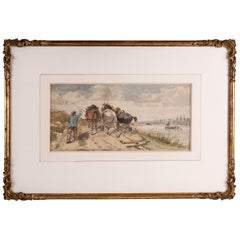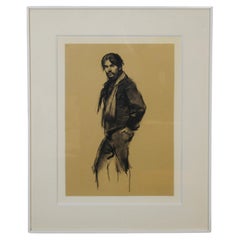Articles similaires à I John Ruskin Aquarelle du 19ème siècle créditée
Vous voulez plus d'images ou de vidéos ?
Demander au vendeur plus d'images ou de vidéos
1 sur 7
I John Ruskin Aquarelle du 19ème siècle créditée
1 900 €TVA incluse
Expédition
Recherche du devis...La promesse 1stDibs :
Garantie d'authenticité,
Garantie de remboursement,
Annulation sous 24 heures
À propos de cet article
This beautiful watercolor drawing of unmatched quality can be assigned entirely likely to the great artist and thinker John Ruskin.
Ruskin's developing interest in architecture, and particularly in the Gothic, led to the first work to bear his name, The Seven Lamps of Architecture (1849).
It contained 14 plates etched by the author.
The title refers to seven moral categories that Ruskin considered vital to and inseparable from all architecture: sacrifice, truth, power, beauty, life, memory and obedience.
Seven Lamps promoted the virtues of a secular and Protestant form of Gothic.
In this important work, the very high quality of the stroke is matched by the skillful search for an atmosphere of recollection that only Ruskin's watercolors can create.
This artwork, never before on the market, comes from an important French private collection
Every item of our Gallery, upon request, is accompanied by a certificate of authenticity issued by Sabrina Egidi official Expert in Italian furniture for the Chamber of Commerce of Rome and for the Rome Civil Courts.
Professional packaging assured
John Ruskin (8 February 1819 – 20 January 1900) was an English polymath – a writer, lecturer, art historian, art critic, draughtsman and philanthropist of the Victorian era.
He wrote on subjects as varied as art, architecture, political economy, education, museology, geology, botany, ornithology, literature, history, and myth.
In all of his writing, he emphasised the connections between nature, art and society.
Today, his ideas and concerns are widely recognised as having anticipated interest in environmentalism, sustainability, ethical consumerism, and craft.
Ruskin first came to widespread attention with the first volume of Modern Painters (1843), an extended essay in defence of the work of J. M. W. Turner in which he argued that the principal duty of the artist is "truth to nature".
This meant rooting art in experience and close observation.
From the 1850s, he championed the Pre-Raphaelites, who were influenced by his ideas.
His work increasingly focused on social and political issues.
Unto This Last (1860, 1862) marked the shift in emphasis.
In 1869, Ruskin became the first Slade Professor of Fine Art at the University of Oxford, where he established the Ruskin School of Drawing.
In the course of this complex and deeply personal work, he developed the principles underlying his ideal society.
Its practical outcome was the founding of the Guild of St George, an organisation that endures today.
In 1833 they visited Strasbourg, Schaffhausen, Milan, Genoa and Turin, places to which Ruskin frequently returned.
He developed a lifelong love of the Alps, and in 1835 visited Venice for the first time, that 'Paradise of cities' that provided the subject and symbolism of much of his later work.
These tours gave Ruskin the opportunity to observe and record his impressions of nature.
His early notebooks and sketchbooks are full of visually sophisticated and technically accomplished drawings of maps, landscapes and buildings, remarkable for a boy of his age.
Before Ruskin began Modern Painters, John James Ruskin had begun collecting watercolours, including works by Samuel Prout and Turner.
Ruskin toured the continent with his parents again during 1844, visiting Chamonix and Paris, studying the geology of the Alps and the paintings of Titian, Veronese and Perugino among others at the Louvre.
In 1845, at the age of 26, he undertook to travel without his parents for the first time.
It provided him with an opportunity to study medieval art and architecture in France, Switzerland and especially Italy. In Lucca he saw the Tomb of Ilaria del Carretto by Jacopo della Quercia, which Ruskin considered the exemplar of Christian sculpture.
He drew inspiration from what he saw at the Campo Santo in Pisa, and in Florence. In Venice, he was particularly impressed by the works of Fra Angelico and Giotto in St Mark's Cathedral, and Tintoretto
in the Scuola di San Rocco, but he was alarmed by the combined effects of decay and modernisation on the city: "Venice is lost to me", he wrote.
It finally convinced him that architectural restoration was destruction, and that the only true and faithful action was preservation and conservation.
Under existing legislation, any artwork created over 70 years ago by an artist who has died can requires a license for export regardless of the work’s market price. The shipping may require additional handling days to require the license according to the destination of the artwork.
- Attribué à:John Ruskin (Artiste)
- Dimensions:Hauteur : 21,5 cm (8,47 po)Largeur : 29 cm (11,42 po)Profondeur : 2 mm (0,08 po)
- Style:Romantique (De la période)
- Matériaux et techniques:
- Lieu d'origine:
- Période:
- Date de fabrication:1880 ca.
- État:Usure conforme à l'âge et à l'utilisation. Défauts mineurs. Défauts structurels mineurs. Décoloration mineure.
- Adresse du vendeur:Roma, IT
- Numéro de référence:1stDibs : LU4827245401492
À propos du vendeur
5,0
Vendeur Platine
Vendeurs premium dont la note est supérieure à 4,7 et le délai de réponse de 24 heures maximum
Établi en 2005
Vendeur 1stDibs depuis 2019
90 ventes sur 1stDibs
Temps de réponse habituel : 3 heures
- ExpéditionRecherche du devis...Expédition depuis : Rome, Italie
- Politique des retours
Certaines parties de cette page ont été traduites automatiquement. 1stDibs ne garantit pas l'exactitude des traductions. L'anglais est la langue par défaut de ce site web.
Garantie d'authenticité
Bien qu'il soit peu probable que la situation se présente, dans le cas où vous rencontreriez un problème d'authenticité d'un article, contactez-nous dans un délai d'un an pour obtenir un remboursement intégral. DétailsGarantie de remboursement
Si votre article n'est pas conforme à la description, est endommagé pendant le transport ou ne vous est pas livré, contactez-nous sous 7 jours pour obtenir un remboursement intégral. DétailsAnnulation sous 24 heures
Vous disposez d'un délai de 24 heures pour annuler votre achat sans motif.Des vendeurs professionnels agréés
Nos vendeurs de renommée mondiale doivent respecter des normes strictes en matière de service et de qualité, afin de préserver l'intégrité de nos fiches produit.Garantie d'alignement des prix
Si vous constatez qu'un autre vendeur a mis en vente le même article à un prix inférieur sur un autre site, nous nous alignerons sur ce prix.Livraison en toute confiance à l'international
Notre réseau de transporteurs de premier ordre propose des options d'expédition spécialisées dans le monde entier, y compris des livraisons personnalisées.Plus d'articles de ce vendeur
Tout afficherDessin à l'encre orientale sur papier du 19e siècle
Important dessin à l'encre de Chine sur papier du 19e siècle encadré
Les idéogrammes étaient souvent accompagnés d'images d'animaux et d'objets, mais parfois aussi de compositions ...
Catégorie
Antiquités, Fin du XIXe siècle, Chinois, Style international, Dessins
Matériaux
Bois, Papier
David Bates Aquarelle Paysage 19ème siècle Double face
Par David Bates b.1840
Belle et intense aquarelle représentant, sur les deux faces, un paysage photographié avec une rare force expressive.
Cette œuvre d'art, jamais commercialisée auparavant, provient d'...
Catégorie
Antiquités, Fin du XIXe siècle, Anglais, Édouardien, Dessins
Matériaux
Papier
Carlo Carrà Credited Italian Art Deco Picture
Dessin en couleur des années 1930 portant au dos l'inscription "Promenade"
Cet important dessin peut très probablement être attribué au maître italien Carlo Canrà.
Le trait beau et ...
Catégorie
Vintage, années 1920, italien, Art déco, Dessins
Matériaux
Bois, Papier
Aquarelle de Yasse Tabuch signée, consacrée et datée
Par Yasse Tabuchi
Aquarelle signée, dédicacée et datée par Yasse Tabuch
Peinture d'art asiatique
La peinture de Yasse Tabuchi s'inscrit dans la même lignée que celle du...
Catégorie
Vintage, années 1980, Japonais, Japonisme, Dessins
Matériaux
Papier
337 € Prix de vente
25 % de remise
Nature morte au crayon signée du 20e siècle
Dessin au crayon magnifique et évocateur
Nature morte aux fleurs et au papillon
Début du 20e siècle
Signé en bas à droite
Le tableau est orné d'un magnifique cadre laqué et doré d...
Catégorie
Vintage, années 1920, italien, Art nouveau, Peintures
Matériaux
Bois, Papier
Domenico Morelli Aquarelle orientaliste du 19e siècle
Par Domenico Morelli
Belle et intéressante aquarelle sur papier attribuée au grand artiste napolitain Domenico Morelli.
Elle représente l'un de ses sujets favoris, à savoir une femme orientale prise dans...
Catégorie
Antiquités, Fin du XIXe siècle, italien, Grand Tour, Peintures
Matériaux
Bois, Papier
Suggestions
Aquarelle, École française, 19e siècle
Paysage avec rivière, Signé en rouge L de N.
Catégorie
Antiquités, XIXe siècle, Français, Dessins
Matériaux
Papier
1 054 € Prix de vente
20 % de remise
Aquarelle du XIXe siècle par Claudio Linati
Par Claudio Linati
Cette belle pièce est issue du recueil graphique Costumes civils, militaires et religieux, du Mexique civil, œuvre du célèbre artiste italien Claudio Linati (1er février 1790 - 11 dé...
Catégorie
Antiquités, Début du XIXe siècle, Mexicain, Autre, Dessins
Matériaux
Papier
Aquarelle de Richard Beavis, École britannique du XIXe siècle
Richard Beavis (britannique, 1824-1896)
Près d'Arles sur le Rhône
Paraphe et titre en bas à gauche.
Encre et aquarelle sur papier/planche.
Avec une ancienne attribution à Bonni...
Catégorie
Antiquités, Fin du XIXe siècle, Anglais, Victorien, Dessins
Matériaux
Papier
983 € Prix de vente
20 % de remise
Esquisse d'un homme au 19e siècle
Cette fascinante esquisse à la mine de plomb du XIXe siècle représente un homme debout, les mains enfoncées dans les poches arrière, faisant face au spectateur. L'artiste capture une...
Catégorie
Antiquités, XIXe siècle, Français, Romantique, Dessins
Matériaux
Papier
XIXe siècle Paire d'aquarelles, école américaine
Oiseaux sauvages de l'Ouest, chacun monogrammé ES en bas à gauche.
Aquarelle sur papier.
Catégorie
Antiquités, XIXe siècle, Américain, Dessins
Matériaux
Papier
2 141 € Prix de vente / ensemble
24 % de remise
Dessin à l'aquarelle du 19e siècle "Saint Augustin" sur papier du 18e siècle
Dessin à l'aquarelle sur papier du XIXe siècle "Saint Augustin" du XVIIIe siècle.
Catégorie
Antiquités, XIXe siècle, Français, Dessins
Matériaux
Papier
